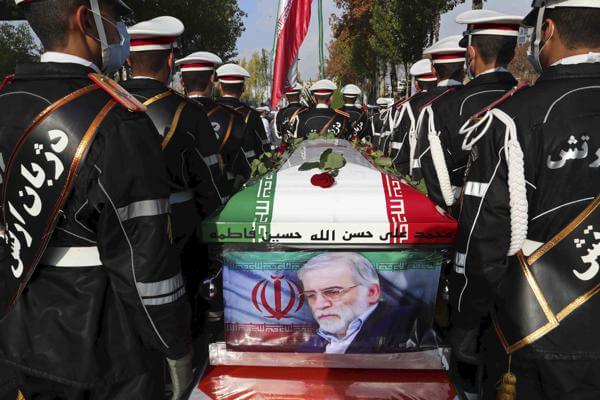In Tehran, an Islamic court Thursday ordered the United States federal government to pay over $4 billion as compensation to the families of numerous Iranian nuclear scientists killed in targeted attacks in the last few years, according to Iranian state-run media reports. Many view the symbolic ruling from the Islamic Republic's courts as another rise in tensions between Iran and the U.S. over Tehran's work in advancing its nuclear program, with negotiations between the two countries producing unsuccessful results.
The ability of the court's decision to gain traction remains unclear, given the various previous Iranian cases against the U.S., as both sides have made threats against each other. Many point out that given the lack of American assets in the Middle Eastern country, the Islamic Republic cannot back up its rulings and demonstrate its seriousness.
"The ruling reflects a strategy by the Islamic Republic to hold its two chief enemies mutually responsible for assassinations, in this case, the United States, the 'great Satan,' and Israel, the 'little Satan," explained Andrea Stricker, researcher at the Foundation for Defense of Democracies (FDD) think tank in Washington D.C.
While the regime under Supreme Leader Ayatollah Ali Khamenei has blamed the Jewish state of Israel in the past for slaying many of the country's nuclear scientists, the recent ruling does not directly accuse the Israeli government. Instead, the announcement by the court only mentions American support for the "Zionist regime" and its "organized Crime" against the nuclear scientists.
According to Stricker, Iran is "responding not only to prior U.S. court judgments holding it accountable for American deaths due to the regime's terrorist operations but to reports that Washington is approving Israeli military strikes against Iranian assets in the region. Tehran is sending a message that Washington also bears responsibility for a range of Jerusalem's actions.”
Not only did the court's ruling demand that the American government must pay billions of dollars in compensation, but it also issued several complaints against former Trump and Obama administration officials. According to the ruling, the court has summoned former Presidents Barack Obama and Donald Trump and State Department officials like former Secretary of State Mike Pompeo, former Defense Secretary Ashton Carter, former Iranian envoy Brian Hook, and many others to stand trial.
These summons by the court are a "symptom of Tehran's long-running grievances against U.S. Iran policy," explained Stricker.
Between 2010 and 2012, high and low-level Iranian nuclear scientists have been mysteriously assassinated by what many believe to be Israeli agents in the Islamic Republic. This trend continued during the Obama, Trump, and Biden administrations, with many scientists having ties to the top officials associated with the Supreme Leader and the IRGC. Many targeted officials have died through motorcycle-bomb explosions on the streets, silencer guns, and other innovative ways.
In November 2020, Iran's chief nuclear scientist, Mohsen Fakhrizadeh, was killed by a now confirmed Israeli-made robot machine gun equipped with artificial intelligence and numerous cameras. Before his death, Fakhrizadeh was unknown to the world until former Israeli Prime Minister Bibi Netanyahu revealed his role as the nation's top chief nuclear scientist in a 2018 presser outlining classified Iranian documents. The regime in Iran has accused the U.S. and the Israeli government of engaging in acts of terrorism against innocent Iranians and that the two countries will pay dearly for their actions.
The Biden administration is currently engaged in stalled negotiations with the Islamic Republic as it seeks to revive the 2015 nuclear agreement revoked under the Trump administration. The negotiations have sparked frustration from Israeli officials who believe that the revived talks will only speed up Iran's ability to obtain a nuclear weapon, prompting the Israeli government to take whatever steps it deems necessary to prevent such actions.
Analysts and researchers like Stricker argue that the announcement from Iran's court today "underscores that Washington's notions of rapprochement or deal-making with the regime should end. The Biden administration should restore a campaign of massive economic, political, and military pressure to counter Tehran's threats across the region and beyond.”










